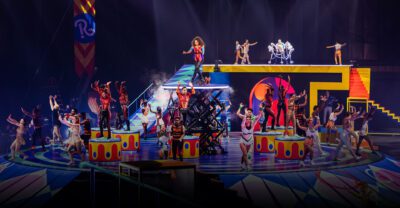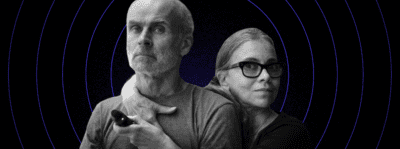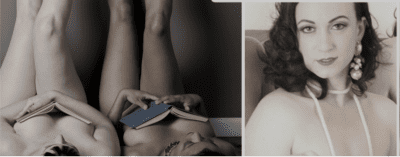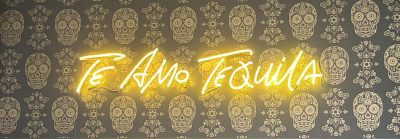D’Onofrio as Kingpin (Photo courtesy of Marvel Studios)
‘Dark and crazy’: Vincent D’Onofrio discusses returning as Kingpin in ‘Echo’
The film and TV star opens up about Method acting, childhood summers in the borough and playing villains
When Vincent D’Onofrio brought Wilson Fisk, also known as Kingpin, to the small screen in Netflix’s “Daredevil” in 2015, the “Full Metal Jacket” actor garnered critical acclaim from critics and fans alike for his dark and gritty portrayal of the iconic Marvel villain.
However, fans were left disappointed when the show was canceled after season three when Marvel Television folded into Marvel Studios.
The actor shared this disappointment. There was so much more left to explore with Kingpin, and although his co-star Charlie Cox believing he was “delusional” to think so, he held out hope that he would eventually get to reprise the role.
D’Onofrio’s wish came true: Not only did Disney+ greenlight a “Daredevil: Born Again” series, he’s gotten to play Kingpin in the 2021 miniseries “Hawkeye” and the upcoming “Echo,” the first Marvel Studios series to debut on Hulu in addition to Disney+.
“Echo” follows Maya Lopez [Alaqua Cox], who lays low after shooting Fisk at the end of “Hawkeye.” She returns to her hometown in Oklahoma and must confront her past, her own family and legacy.
This interview has been lightly edited for concision and clarity.
It was quite a gamble to have a relatively untested character like Maya Lopez leading a Marvel series. Why do you think it works so well?
We accomplished a lot on the original “Daredevil” series on Netflix. We showed that these smaller characters in the MCU, it’s worth telling their stories. So it all stems from the success of “Daredevil” and “Hawkeye,” I think it was the way to go. “Echo” has a very similar tone to the “Daredevil” series and Kingpin/Wilson Fisk works well in that kind of surrounding.
Do you think this street-level action is where Marvel thrives?
For sure! The new “Daredevil: Born Again” is going to be very much like that. It’s going to be an emotional examination of those two men, Matthew Murdock and Wilson Fisk and examining this iconic hero and villain [dynamic] a bit deeper. It’s going to be pretty cool. It has that same feeling of what we did in the original Netflix series.
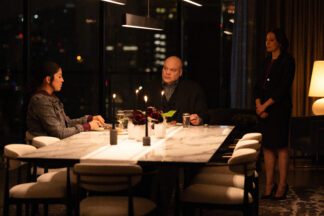
(Photo courtesy of Marvel Studios)
What’s it like to develop a character like Kingpin throughout all these series?
There’s a lot to explore there and I’m certainly not getting bored with it at all. We are having some pretty deep stuff on the new series so it’s working well!
Why do you think audiences are drawn to the villains?
The best kind of villains that I’ve played in my career are the ones that you get attached to. You want them to lose but also win, because you don’t want them to go away. As an audience member, when I’ve seen other men and women play villains that I’ve felt excited about, I didn’t want them to lose because I didn’t want their part to end. That’s the key, if you can ground it enough so that people get attached to the character then it works really well when they’re truly awful people.
I was recently watching “Gladiator” and Kingpin reminds me of Joaquin Phoneix’s Commodus, someone who has absolute power and on the surface can be quite meek but at the flip of a switch becomes a monster.
I’m glad you noticed that because that is the best way for me to play these types of characters, to play them as real people. To play the person and not the villain is really important. Sometimes they make poor choices and if they have a strength and emotional brokenness that follows them around in their life, that kind of thing can be really dangerous.
Do you think that’s why the character is so popular because he is human, rather than some intergalactic titan?
That can be fun too, but it’s a little more heightened in science fiction. What we’re doing is bringing more realism, that’s why when the violence happens, it happens in a darker and more realistic way. And when the emotional stuff happens, it happens in a deeper way as well.
You’ve expressed your desire for Kingpin to meet Spider-Man in the MCU. Do you see their worlds colliding?
I hope it does, I hope they figure out some way to do it that would be nice. As an actor, my job is to serve the story, so whatever the story is I have to fit into it, that’s my job. I’m up for anything.
How much has playing Wilson Fisk changed your own career?
It hasn’t changed it that much. Every once in a while when the acting gods are with me I’ll create a character that people like and lasts for a long time. Some of the characters I’ve created in the past are still at the tips of people’s tongues like Edgar in “Men in Black,” Private Pyle in “Full Metal Jacket” and Robert Goren in “Law and Order: Criminal Intent.” When it works, it works in this great way. It’s the same thing with Wilson Fisk. It’s a very interesting character for me, I don’t get bored with it so I keep the character evolving.
For “Full Metal Jacket” you used the Method acting approach. Has that changed throughout your career or do you still approach acting in this way?
I use many different techniques. I guess I’m mostly a Method actor but to help service the story I’ll do whatever I need to do to do it correctly. But when I’m playing Wilson Fisk it gets deep, so I’m using a lot of techniques that were birthed through Stanislavski and eventually The Method.
What is it like to get in that headspace, because it is a dark role?
Yeah, it hurts a little bit. It’s dark and crazy. They don’t even have to be violent scenes but I’ll be doing emotional scenes in his headspace and it’s exhausting, it’s not digging ditches but you definitely feel like you’ve earned your money at the end of the day.
Do you have techniques to shake off the dark roles?
Yeah, I shake it off immediately when I’m done. It comes to a point in the day where I can’t wait to finish, I start to get happy when I know the day is ending soon. I just immediately drop the character, over the years I have learned to bring it on and then let it go.
You were born in Brooklyn. What were your early years like in the borough?
I was partly raised in Brooklyn because that’s where my grandfather’s house was, I was born there. That’s where my grandparents, aunts and uncles and cousins lived. I’m mostly from Florida, but I spent all my summers in Brooklyn throughout my childhood. I just have great memories. It was very Italian, both sides of my family are Italian, they are all immigrants and incredible people.
What comes to mind when you think of New York?
I think of these long walks in Brooklyn and the types of people that we would meet. We lived in a very mixed area — there were African Americans, Polish and Jews and people of all kinds. It was a real mix of these wonderful cultures, foods and cool people.
How did Brooklyn influence your career?
The first cinemas that I went to were in Brooklyn on 65th Street, near 18th Avenue. The biggest movies that I saw as a young adult were in Brooklyn. When I was in my 20s, I went to acting school and everything I learned about how to be an actor happened here in New York City. I have really fond memories of the people who helped me in my career — the teachers, the other students that inspired me and my mentor Sharon Chatten, there’s a lot of New York memories like that.
What was the first film you saw in the cinema?
“Sound of Music.” There were also many more, like the James Bond films. I’m going back to when I was young but my Dad also used to take us to drive-ins in Florida, so I saw some pretty big epic war movies in Florida drive-in theaters.
You might also like 

















